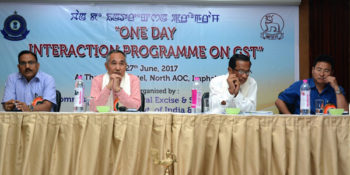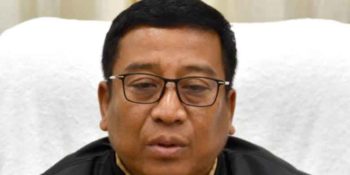Imphal: As part of the State Government’s initiative to create awareness to the dealers, stakeholders, businessmen & the general public of the State about the GST bill and its uses following its passage on the 6th of this month by the Manipur Legislative Assembly, a one day interactive programme on GST was held at the Classic Hotel, North AOC today. The discussion session was organised by the Commissioner of Central Excise & Service Tax, Shillong, Govt. of India in association with the Commissioner of Taxes, Department of Taxes, Govt. of Manipur.
The programme attended by Hon’ble Deputy Chief Minister & in-charge Finance, Taxation & Excise, Govt. of Manipur, Shri Y. Joykumar Singh; Chief Secretary O. Nabakishore Singh; Commissioner of Central Excise & Service Tax, Shillong, Shri Gaigongdin Panmei (IRS); Commissioner (Finance), Govt. of Manipur Shri Vivek Kumar Dewangan as the Chief Guest, President & Guests of Honour respectively focused primarily on educating the masses about the various aspects of the GST bill, its multi benefits & the know-how of its registration and payment methods.
In the inaugural phase of the interactive programme, Taxation Commissioner, Govt. of Manipur Shri Hrishikesh Modak felicitated the dignitaries present today and gave an in depth PowerPoint presentation on the main topic: “Interaction programme for the tax holders” that includes different slides on basic concept of GST, salient features & benefits of GST registration, returns, offline utility, payments and offenses under GST.
“The GST would subsume 8 Central and 9 State taxes. A five tier GST tax structure of 0%, 5%, 12%, 18% and 28% has been approved by the GST Council,” Hrishikesh explained.
Today’s interactive programme is mainly aimed at giving a brief insight on the benefits of the GST regime on the economy of Manipur & is an outcome of an earlier detailed brainstorming session with the Chief Secretary, said Vivek Kumar Dewangan while delivering his introductory speech that the GST portion comprises of both the Central GST as well as the State GST. He also said, “There will be 28% tax on luxury items & tobacco products while there will be no tax on farm products. We are making a facilitation centre in the old High Court Complex in case of any problem regarding registration or any other issue related with GST that will be effective from July 1, 2017.”
Giving a glimpse of what the public should know as taxpayers, Gaigongdin Panmei said, “We should try to learn the basics of GST like entertainment tax, amusement tax, service accounting code(SAC), composite supply, mixed supply, invoice, payment voucher, reverse, credit note & debit note. What exactly is taxable? What is valuation? What will you do when your tax is wrongly charged? Know the transition rules. What will you do with your old stock?”
Elaborating that there’s lots to gain by both the public & the State with the implementation of the GST bill, O. Nabakishore Singh said that it will have a direct impact on the consumers as the tax rate will be lowered, goods will be cheaper & the consumers will be the happiest. The consumers will have lots of money in their pockets to spend, the demands of goods will increase that will lead to the improvement of our State’s economy. In addition, “Make in India” programme will get a boost and GDP is expected to increase by 1-2% from its normal 7.1-7.2%, he also said.
He further said, “GST is a destination based taxation regime. We import 90% of goods from outside the State. We would like to widen our tax base. Service tax has become a part of GST. Most of the advocates will be exempted from payment of service tax except in case of senior ones who have a turnover over Rs. 10 L.”
Highlighting on the concept of one country-one tax, Shri Y. Joykumar said that implementation of the GST bill is a good step to curb the leakages in tax collection as this tax will subsume all other tax and there will be improvement in tax collection and resource mobilisation, economy will be more buoyant & GDP will grow double-digit figure as expected . Clearing the misconception of the public that that things will become more costly, he replied, “This is a wrong fallacy, the cost of the products will be the same or even lesser in the new GST regime. Any entrepreneur whether brick owner or stone crusher will have to compulsorily register if they have a turnover of Rs. 10 L.”
Briefing that there are 3 types of GST viz. Central, State & Integrated, he said that in case of IGST, 50% tax will go to Central & the remaining 50 % tax will go to the consuming state and not to the originating state.
Regarding VAT in case of specified petroleum goods and State excise duty for alcoholic liquor under human consumption, it will be discussed at later stages, he finally said.
Interested dealers, stakeholders, lawyers & businessmen participated in today’s interactive programme.
During the interactive session , the dignitaries discussed different topics on GST bill with the participants & replied their queries.












